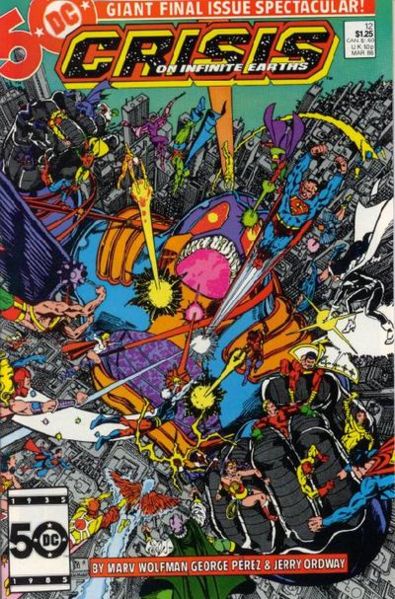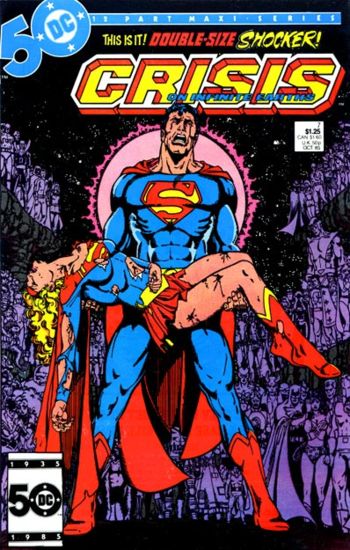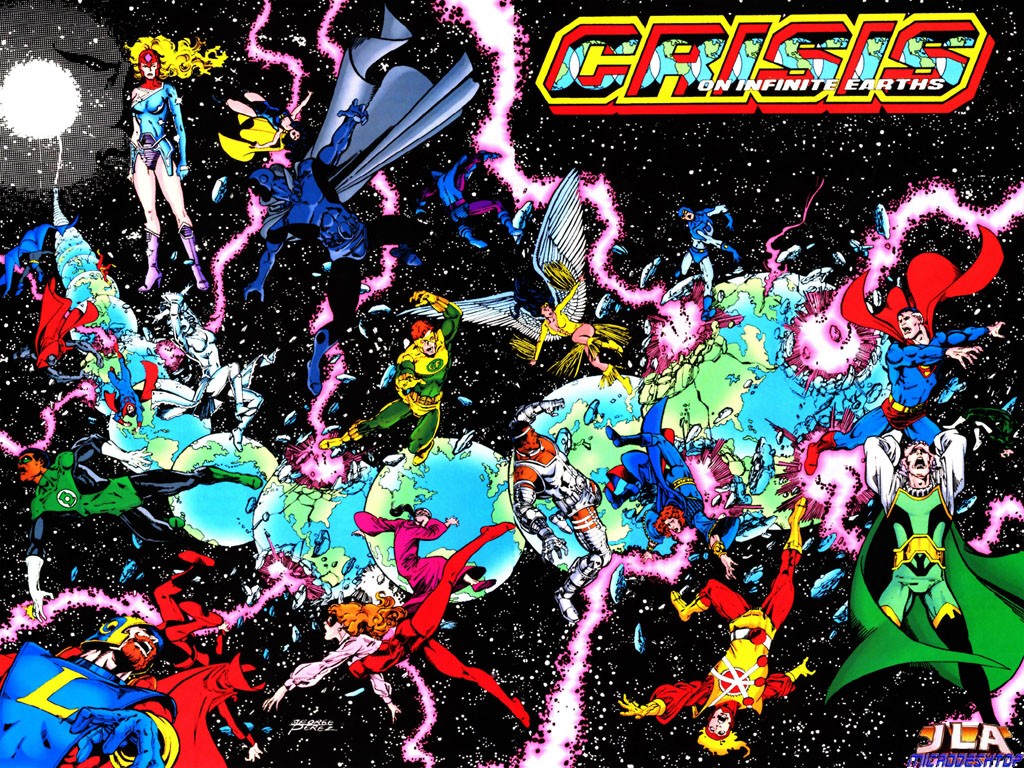Should you buy and read Crisis on Infinite Earths? Not unless you have no other reading material.
Should you Google Crisis on Infinite Earths? Ues.
Crisis on Infinite Earths is, according to reputation, one of the greatest crossovers in comic book history, largely because of the massive changes wrought by the series. It’s 12 issues long, and when I say long, I mean long.
The premise is simple. All of DC’s different Earths are in peril. Heroes band together to stop it. Every major DC character (as of 1986) appears, even if it’s only for one panel.
The problem with Crisis is that each issue assumes you have not read any issues preceding it. So each issue has at least 5 or 6 pages showing the chaos that is happening across each Earth, repeating information that you should already know from, gee, I don’t know, the eponymous title?
Although it’s a great way to showcase every DC character (and sell comics/toys/merchandise), it’s terrible, terrible storytelling. It forces the plot to a crawl, and what might have started as a mystery becomes a very dead and flogged horse.
Because you don’t see the villain of the series until issue 6 (you see him in the final panel of 5, but that’s it). And he has such a terrible name, the Anti-Monitor. It’s like calling him the Anti-Looker. Or the Anti-Seer. He has no characterisation beyond “I want to eat every other universe except my own” which makes him even less of a character than Galactus (not that Galactus has no character, but he’s kind of one note).
I thought that maybe in the 80s, characterisation wasn’t really important, motivations weren’t really an issue, and all people really wanted to see when they read comic books were colourful superheroes doing fantastical things.
Then I realised Dark Phoenix Saga came out 6 years ago. A tale where the villain wasn’t black and white, the antagonists weren’t all out evil, and where you properly understood the motivations of the characters and the terrible tragedy of the ending and death(s) that followed.
In Crisis, the deaths… have no impact. There’s no real foreshadowing, you don’t see much of their character before they die, and there’s no sense of pathos when they bite it. It just feels sensational rather than impactful and necessary (then again, the deaths were supposed to be unexpected) since you don’t come to identify or empathise with the character who dies, since there is a severe death of characterisation.
Which leads me to another failing of the series. The lack of characterisation of anyone. There are just so many characters to showcase that really, their dialogue all sounds the same. They all have the same motivations – self preservation. There’s no subtext (thought balloons are not subtext) in their interactions.
Well, you might say that anyone who reads it is supposed to know all the characters there already, and no additional characterisation is necessary. I’ll bite.
But then Pariah and Harbinger, the two new characters introduced in Crisis on Infinite Earths, are just as flat. I remember them only for their powers – not for their sacrifice or characterisation. Pariah whines about the same thing every issue “oh my powers will help save you all but they are such a curse boo hoo” while Harbinger will either be going “this is such a strain on my powers but I must do it because my powers are oh so special” or “this is such a strain on my powers but I must do it for my dearly departed mentor.”
The only series I think would be worse than this are Final Crisis or Ending Battle (Superman). Or Maximum Carnage.
Yes, I don’t like the Crises. Infinite Crisis was probably the best done of the “trilogy”, but even so I recommend Tower of Babel or The Search for Kryptonite (Superman/Batman) instead.
Reading this was really a crisis.




Leave a Reply